 Petzlover
Petzlover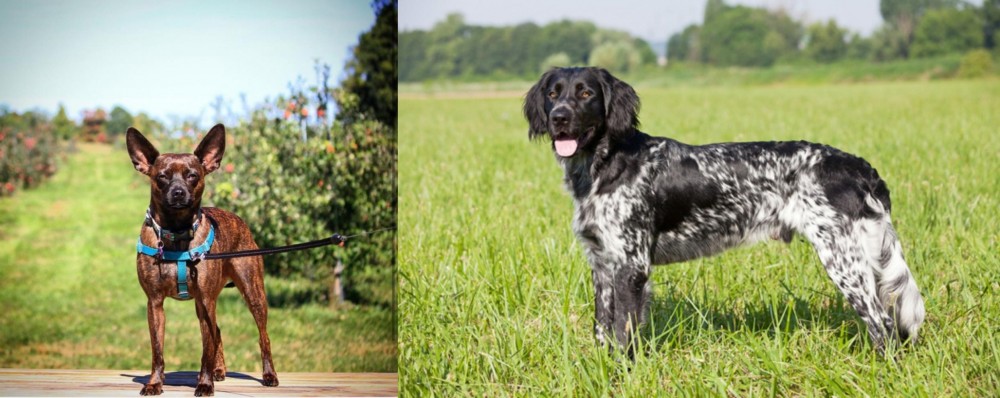 Bospin is originated from United States but Large Munsterlander is originated from Germany. Bospin may grow 27 cm / 10 inches shorter than Large Munsterlander. Bospin may weigh 21 kg / 46 pounds lesser than Large Munsterlander. Both Bospin and Large Munsterlander has almost same life span. Bospin may have less litter size than Large Munsterlander. Bospin requires Low Maintenance. But Large Munsterlander requires Moderate Maintenance
Bospin is originated from United States but Large Munsterlander is originated from Germany. Bospin may grow 27 cm / 10 inches shorter than Large Munsterlander. Bospin may weigh 21 kg / 46 pounds lesser than Large Munsterlander. Both Bospin and Large Munsterlander has almost same life span. Bospin may have less litter size than Large Munsterlander. Bospin requires Low Maintenance. But Large Munsterlander requires Moderate Maintenance
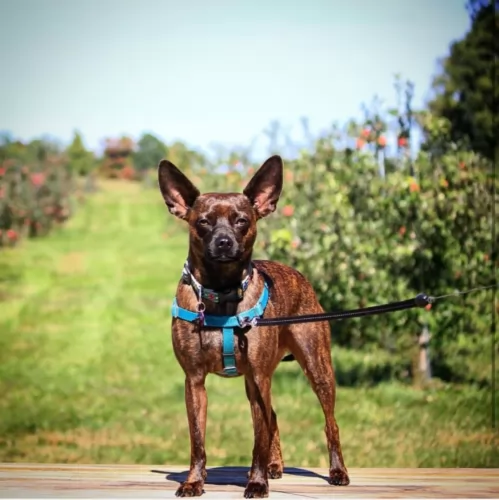 The Bospin is a fairly new breed of dog and is the result of cross-breeding between the Boston Terrier and the Miniature Pinscher.
The Bospin is a fairly new breed of dog and is the result of cross-breeding between the Boston Terrier and the Miniature Pinscher.
Mixed breed dogs are often healthier than full blood dogs and are becoming a popular choice. The origin of the Bospin is unknown. We know that the Boston Terrier hails from Boston in the USA and the Miniature Pinscher from Germany.
 The Large Münsterländer hails from the Münster region in Germany. It was in 1919 that the first breed club was founded.
The Large Münsterländer hails from the Münster region in Germany. It was in 1919 that the first breed club was founded.
The dog’s ancestors were different Spaniel breeds as well as the German Longhaired Pointer. The dog quickly became a sought after hunting dog in Europe.
The Large Munsterlander Association of America is the only official breed organization for this dog. The dog was recognized by the United Kennel Club in 2006.
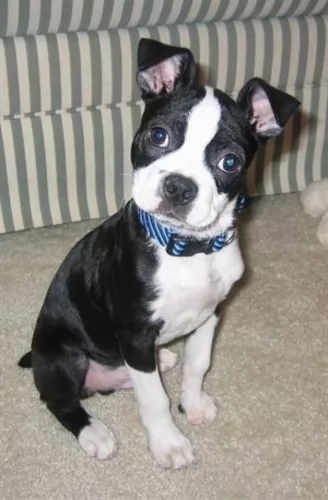 The Bospin, a cross between the smooth haired Boston Terrier and the Miniature Pinscher can actually get any combination and characteristics of either of these two breeds. found in either breed. The Bospin in a small to medium sized dog who can live to be up to 15 years of age.
The Bospin, a cross between the smooth haired Boston Terrier and the Miniature Pinscher can actually get any combination and characteristics of either of these two breeds. found in either breed. The Bospin in a small to medium sized dog who can live to be up to 15 years of age.
He has a short coat, but his looks will essentially depend on which is the more dominant breed. Regardless of which breed he takes after in looks, he will be a muscular little dog with long, lean legs and a long tail. They have small muzzles and a fairly long nose with brown eyes and upright ears. The short coat can be in a number of colours such as brown, beige or brindle, with black and white being a more common colour.
The Bospin’s personality can be a blend of the Boston Terrier and the Miniature Pinscher. They’ve become such popular little dogs, full of fun and just loving to be with their human family. Because they are fairly even tempered, they make excellent family pets and will get on well with children in the home as well as other pets. This is a small dog but he isn’t a yapper. He isn’t going to make a wonderful watchdog as he can be quite friendly with strangers.
 The medium to large Large Munsterlander stands between 60 to 65cm at the withers and weighs about 28 to 32kg.
The medium to large Large Munsterlander stands between 60 to 65cm at the withers and weighs about 28 to 32kg.
When you look at him, you get the feeling that you’re looking at a springer spaniel. He has long broad feathery ears and also a long feathery tail. The head is fairly broad and somewhat rounded.
The coat of the dog is long and dense, and is quite wavy with feathering around the legs and tail. He can be black and white or be a reddish brown with patches or ticking because of the piebald gene. If you allow your Large Munsterlander to become a parent, the average litter of this dog is 5 to 10 puppies.
The Large Munsterlander is essentially a tracking, retrieving dog. He makes an excellent hunting dog and these instincts are strong within this particular breed. It is why some breeders only give their puppies to serious hunters.
He is an active dog, and because he loves to retrieve, ball games will suit him down to the ground. Take him with you on your walks as he is a naturally athletic, active dog.
He loves water too and won’t need a second invitation from you to jump right into dams or pools. He is such an easy going dog, getting on well with children and pets in the home and being a good first choice for first time dog owners too. However, he requires plenty of exercise.
Because he is a hunting and retrieving dog, he will be far better suited to living in a home where there is a fair sized garden. He isn’t regarded as a city dwelling dog. These are dogs that just love to be outside and running around.
The Large Munsterlander can be a boisterous dog, so teaching him some basic commands such as ‘come, stay, lie-down, sit or heel’ will improve the way he behaves inside the home and when in the company of other people.
Training and socialization will do him the world of good and it means you can take your dog anywhere – he’ll always be well behaved, becoming a calm, gentle dog.
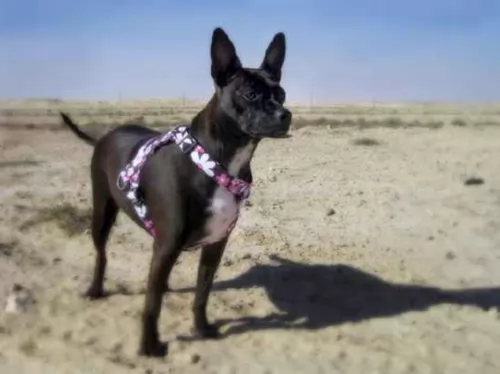 The Bospin is an adaptable dog and can easily fit into farm life or city life. When he is trained and socialized he makes an amicable pet, ready to be a loyal and devoted companion.
The Bospin is an adaptable dog and can easily fit into farm life or city life. When he is trained and socialized he makes an amicable pet, ready to be a loyal and devoted companion.
The Bospin’s personality can actually lean more towards either the Boston Terrier or the Miniature Pinscher, but you’re always going to have fun and games with these entertaining little dogs. They just love the companionship of their human family.
A Bospin needs to be brought into a stable environment so that he can adapt to his new home easily and not be confused by constant changes. Be responsible with your pet and make him one of your family and you’ll be rewarded with an entertaining, fun, loyal 4-legged friend.
 As a sporting dog, the Large Munsterlander loves his exercise. You can involve him in all kinds of outdoor activities, and he’ll readily join in, from swimming, to hiking to ball games to just plain running for the fun of it.
As a sporting dog, the Large Munsterlander loves his exercise. You can involve him in all kinds of outdoor activities, and he’ll readily join in, from swimming, to hiking to ball games to just plain running for the fun of it.
Always be careful with puppies though, before you involve such a young dog with such strenuous exercise. For a better chance of avoiding hip dysplasia, it is better to wait till he is about 12 months old before you involve him in too many lively activities.
He’s an easily trainable dog too, and the fact that he is a calm, gentle dog who is loving and loyal makes him an excellent pet choice.
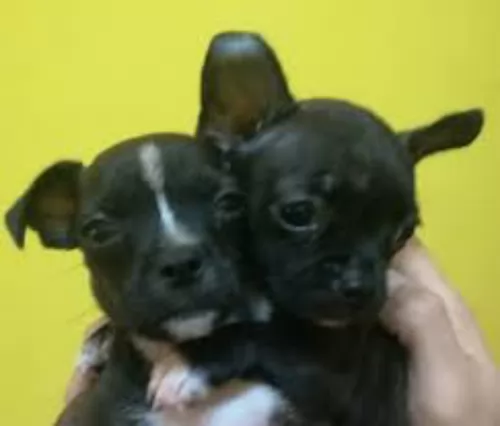 Your Bospin is a healthy dog breed, but the most healthiest pets can fall victim to health problems. There are some conditions that are specific to certain types of dogs and smaller breeds have their own set of worrisome dog ailments.
Your Bospin is a healthy dog breed, but the most healthiest pets can fall victim to health problems. There are some conditions that are specific to certain types of dogs and smaller breeds have their own set of worrisome dog ailments.
Smaller dogs or toy breeds have smaller skulls and sometimes their smaller mouths have to find room to house the 42 teeth that dogs have. This over-crowding can lead to dental disease.
This is a common problem in brachycephalic breeds – those dogs that have short, broad muzzles such as the Boston Terrier. Toy breeds are more prone to tracheal collapse, a common cause of airway obstruction in dogs where the dog develops a rasping cough and labored breathing.
This is a developmental orthopedic disease where you see degeneration of the femoral head and which can lead to arthritis. The disease affects young animals and more specifically toy breeds. Your dog will have trouble walking and will usually hold one leg up. Your dog can battle along with pain and arthritis.
 All dogs can develop some health problems no matter how healthy they are, but when they are happy dogs, they’re well fed, exercised and loved, they have a better chance of reaching a ripe old age.
All dogs can develop some health problems no matter how healthy they are, but when they are happy dogs, they’re well fed, exercised and loved, they have a better chance of reaching a ripe old age.
Large Munsterlanders are generally healthy dogs. Some conditions reported in the breed which are highly unlikely to affect your dog, but are good knowing about are hip dysplasia, cataracts and osteochondrosis.
This is a common condition where the joints of quickly growing puppies are affected. The surface of the joint doesn’t convert into bone in certain areas. The result is thickened cartilage which detaches from the surrounding normal cartilage, forming a flap.
Osteochondrosis causes the development of osteoarthritis, affecting certain joints of the dog. Both genetics and the wrong diet are causes of osteochondrosis.
It isn’t always possible to feed your dog wholesome food, but always try to get the very best quality food there is. Also, don’t allow your young Large Munsterlander to be involved in strenuous exercise before he reaches one year of age. Pounding around can put abnormal weight on the joints which can spell problems when the dog is older. Osteochondrosis mostly affects large and giant breed dogs.
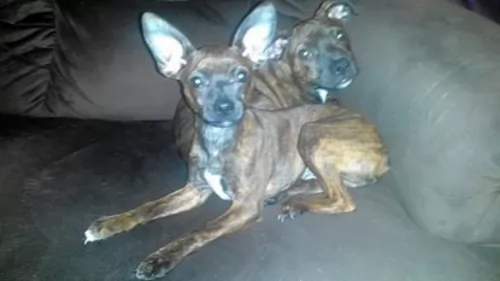 Because of the short coat and minimum shedding, your Bospin will only require minimal maintenance. Brush him down at least twice a week to keep the short coat free of loose hair and to also keep it shiny and glossy. As with any other dog breed, he should have his teeth brushed at 2 or 3 times a week with special dog toothpaste and toothbrush. Don’t be tempted to use human toothpaste. Check his ears too to make sure they are free of dirt and infection.
Because of the short coat and minimum shedding, your Bospin will only require minimal maintenance. Brush him down at least twice a week to keep the short coat free of loose hair and to also keep it shiny and glossy. As with any other dog breed, he should have his teeth brushed at 2 or 3 times a week with special dog toothpaste and toothbrush. Don’t be tempted to use human toothpaste. Check his ears too to make sure they are free of dirt and infection.
The Bospin is a hybrid breed and because he comes from two energetic dogs, you’ll need to provide him with activities to keep him busy. He will love to go on a walk with you and you can play ball games with him in the garden or even indoors. He isn’t a working dog so he isn’t going to demand too much activity, but it is better to get into the habit of exercising him regularly to keep him in good shape and to maintain his good health.
Bospins need to be fed carefully to avoid weight issues or health problems. Puppies need to eat frequently - 4 times a day. For your Bospin, always go for top quality commercially produced dog foods where meat is the top ingredient. Home made foods are always a wonderful choice for your pet and this can include meat, rice and vegetables.
If you’re unsure about feeding your dog, get advice from your vet. Always have fresh, cool water available and make sure you wash out the water bowl regularly.
 The Large Munsterlander puppy will require 4 meals a day. When he reaches a year of age, you can give him two smaller meals a day.
The Large Munsterlander puppy will require 4 meals a day. When he reaches a year of age, you can give him two smaller meals a day.
He is a large, active dog and if you feed him manufactured dog food, make sure its high quality and that it caters to his age and energy levels. His dry kibble can be mixed with cooked chicken, brown rice or pasta and cooked or raw vegetables occasionally.
Raw meat can be expensive, but every dog requires some raw meat in the diet every now and then. Without some raw meat, you dog may well suffer with skin problems and a dull coat.
If your dog is still an active hunting dog, a high fat, high protein diet will be good for him. When in any kind of doubt, speak to a dog expert or your vet about how to feed him for health and longevity.
As a sporting hunting dog, the Large Munsterlander has high exercise needs. He most certainly won’t do well in a tiny city garden as he is an outdoor dog wanting to be running and exercising. If you choose this particular dog breed, make sure that you take him on walks, allow him off his leash in the park, play ball games with him and take him with you when you go on hikes.
With his silky coat, you want to be brushing your pet twice a week. If he has been out hunting with you, while brushing him, check for twigs, grass and burrs tangled in the hair.
Other basic care includes trimming the nails, keeping the ears clean and dry inside, brushing the teeth with a canine-approved pet toothpaste and toothbrush for good overall health.